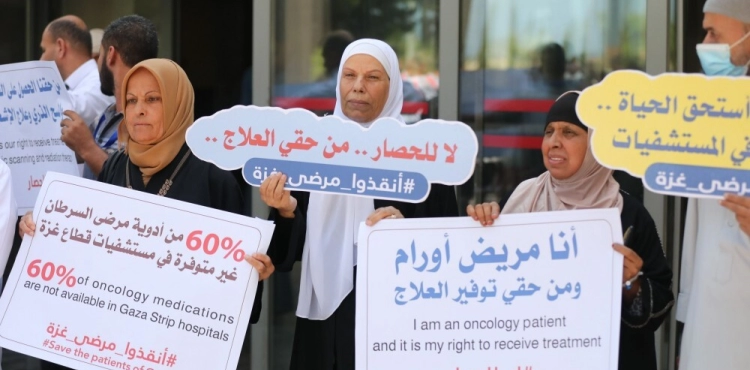Cancer Patients in Gaza Demand Access to Their Treatment and an End to Their Continuous Suffering"
Cancer patients in the Gaza Strip demanded today, Thursday, the provision of their medications and an end to their ongoing suffering as a result of the Israeli blockade imposed on the Gaza Strip.
This came during a protest held in front of the Turkish Friendship Hospital in the region.
Sobhi Skik, the General Manager of the Turkish Friendship Hospital, stated: "Our message during this stand is to convey the suffering of cancer patients in the Gaza Strip to the whole world and the extent of the suffering they face due to the lack of resources, medications, and specialized treatments."
Skik added that more than 9,000 cancer patients are present in the hospital, while the number of inpatients reaches 100 patients.
He mentioned that cancer patients in Gaza suffer from a shortage of diagnostic and treatment capabilities, along with a continuous increase in the cancer incidence rate among the population.
Skik pointed out the "lack of availability of radiation therapy for cancer patients in Gaza, as well as the lack of diagnostic and therapeutic nuclear medicine capabilities, in addition to the unavailability of some essential medical tests for tumor diagnosis."
He called on the international community to "urgently save the lives of cancer patients and provide them with the deserving treatment services."
One of the patients stated during her participation in the protest: "As cancer patients in the Gaza Strip, we repeatedly endure suffering due to the unavailability of our specific medications."
She added that the absence of cancer treatment systems in Gaza, the continuous denial of travel permits abroad, and the ongoing rejection by Israeli authorities, all increase the risk of deteriorating health conditions and loss of lives for the patients.
The patient issued an urgent plea for swift intervention to change the painful reality facing cancer patients. She requested the provision of radiation therapy, chemotherapy, and all necessary medical tests, along with financial and moral support for the patients.
She urged local and international entities and organizations to support the rights of cancer patients and alleviate their continuous suffering by pressuring the occupation to facilitate the movement of patients and their access to specialized medical facilities.












